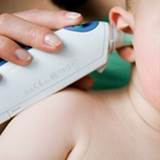- Diarrhoea
- Vomiting
- Unexplained rash
- Difficulty breathing
- Loss of appetite
- Irritable behaviour or lethargy
- Cough
- Fewer wet nappies than normal
My baby has fever. What should I do?

babyadmin |
Unlike adults, your newborn infant is not yet able to fully regulate their body temperature. As a result, when they do develop a fever, it may or may not be due to an infection. As they get older, the layer of fat that they gain on their bodies will help with better regulating their body temperature.
Fever in an infant younger than 3 months old should always be regarded seriously.
Signs of fever
Your baby has a fever if their temperature generally measures 38 degrees C or higher for infants younger than 3 months and 39 degrees C or higher for those 3 months or older. There are some variations among temperatures taken orally, rectally, from the ear and from under the arm. Read through the instructions that come with your thermometer or check with your doctor for specifics.
Causes of fever
It may feel natural to wrap your newborn in warm clothing and swaddle them tight to give them comfort. You must be careful, however, to not overheat your baby, especially in hot and humid Singapore. Ensure that the car is sufficiently cooled before seating your infant. This is because overheating can cause a fever, and in more serious cases, even heat stroke.
Fever in the early days of life can be caused by dehydration. Most often this happens because of challenges faced in starting breastfeeding. Seeking help and guidance from lactation consultants early is therefore important for mothers who are having trouble.
Fever is also a symptom of an infection, though some babies with an infection do not develop a fever. This is where it is important for parents to look out for other symptoms of illness or changes in behaviour as well. Since there is a wide range of possible infections, your doctor will determine the diagnosis by taking into consideration factors such as your baby’s age, whether they are premature, the method of delivery, and the other symptoms that you observed.
Risks of fever
The severity of your child’s fever will depend on the associated illness and the degree to which their temperature is above normal. Some of the more serious infections associated with fever include, pneumonia, meningitis and urinary tract infection. In children younger than 3 months, however, a fever should always be treated seriously as their immune system is still weak. About 1 in 10 infants younger than 3 months is diagnosed with a serious bacterial infection.
Dealing with fever
If your child has a fever, it is best to see your doctor to determine the underlying illness. Take note of the other symptoms that your child may be exhibiting. These include, but are not limited to:
